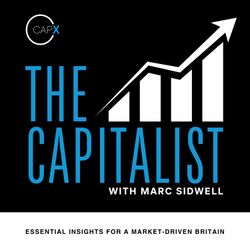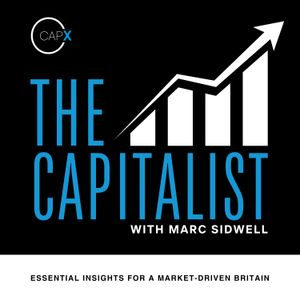Latest episode

15. Despatch: Steel Trap — Why Nationalisation Won't Work
05:55||Season 1, Ep. 15Harry Phibbs asks a pointed question in this week's Despatch: if nationalisation has failed before, why are we doing it again? With Parliament recalled for an emergency Saturday sitting to save British Steel, the political consensus was deafening — and expensive. But is this really a matter of national security, or just another costly round of state interference dressed in patriotic clothing? From HS2 to Net Zero, Phibbs argues that consensus is the real danger — and nationalised steel is the latest case in point. Tune in for a sharp-eyed look at Britain’s industrial nostalgia, and why we should all be watching our wallets.
More episodes
View all episodes

14. Economic Nostalgia vs. the Hard Work of Growth
33:48||Season 1, Ep. 14A dramatic Saturday recall of Parliament delivers a last-minute reprieve for British Steel — but is it a genuine industrial strategy, or just another short-term fix? Meanwhile in Washington, President Trump promised to revive American manufacturing. But can you really rebuild the past — or is this economic cosplay doomed to fail? Broadcaster Albie Amankona and the IEA’s Daniel Freeman join CapX’s Marc Sidwell to ask a vital question — can Britain resist the noise and rediscover the quiet power of centre-right pragmatism?
Despatch: No Growth, No Progress
07:13||Season 1Britain isn’t broken — but it is stuck. In this urgent Despatch, Julia Willemyns, co-founder of the Centre for British Progress, makes the case for boldness over drift. Why has growth stalled? Why does everything feel harder, slower, smaller than it should? And why have both Left and Right abandoned the ambition to build? With sharp insight and a rallying cry for change, Willemyns lays out a compelling vision: one that trades bureaucracy for dynamism, timidity for courage, and economic stagnation for social progress. If Britain wants to lead again, it has to learn how to build again.
13. Backlash Economics: When Policy Meets Pocketbooks
33:39||Season 1, Ep. 13What happens when the world’s biggest economy slams the brakes on global trade? In just weeks, Donald Trump’s tariff blitz has shattered decades of US-led liberalisation — and the fallout is only just beginning. As prices creep higher and wallets tighten, will the political backlash bite harder than the economic one? And in the UK, could fiscal fear turn into fiscal flair? CapX editor Marc Sidwell is joined by the IEA’s Reem Ibrahim and Dominic Pino of the National Review Institute to explore whether this era of upheaval might just offer the chance to rewrite the economic rulebook.
Despatch: Mel Stride, Robert Colvile, David Miles and Alys Denby
33:49||Season 1Rachel Reeves entered her first Budget with a familiar refrain—blaming the Conservatives for the difficult choices ahead. But now, the focus has shifted to her own decisions, particularly the impact of tax rises on business confidence, jobs, and growth. Can her latest fiscal measures break Britain free from economic stagnation, or have they only deepened the challenge? CapX Editor-in-Chief Robert Colvile leads a live discussion with Shadow Chancellor Mel Stride, David Miles from the OBR Budget Responsibility Committee, and Alys Denby, Opinion and Features Editor at City AM.
12. Regulation Nation: Why Britain is Losing Its Best and Brightest
29:29||Season 1, Ep. 12Rachel Reeves envisions Britain as a “defence industrial superpower” — but does the industry exist to match the ambition? Meanwhile, London eyes Brussels for a reset, with hopes that closer ties could unlock growth. And amid high taxes and tight regulation, is Britain’s economic model locked in for good? Marc Sidwell is joined by Julian Jessop and Maxwell Marlow to dissect the latest political currents and market shifts.
Despatch: Our Growth Problem is a Productivity Crisis
06:02||Season 1Britain is spending more than ever—but getting less. Public debt is soaring, growth is non-existent, and dissatisfaction with public services has never been higher. The government talks tough on cuts, but the real crisis is deeper: a bloated state that punishes efficiency and rewards failure. The one word no politician dares to take seriously? Productivity. If public sector performance matched the private sector, we’d unlock £100bn a year—no tax hikes, no cuts, just better government. So why isn’t it happening? And who, if anyone, has the courage to fix it? Listen now to Tim Knox's diagnosis of Britain's great stagnation—and what we can do about it.
